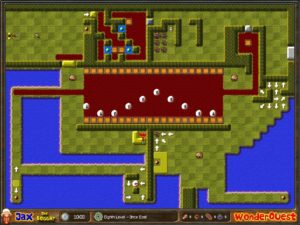Wonderquest: Level 8 Reflections
I’m up to Wonderquest‘s eighth level, which I think must be just about where I stopped the first time around. One thing in particular I remember: some dialogue where someone asks Chen the Scientist whether he believes in God. This isn’t something you often see discussed in games that aren’t specifically about God, although it’s plausible that it would come up in the circumstances. You’ve got a bunch of strangers from different walks of life and different cultures thrown together and relying on each other for survival over a longish period; it makes sense that they’d want to sound each other out on matters they consider important. But it would be an uncomfortable moment, and I remember it made me a little uncomfortable even to see it in the game back then, especially when the designated scientist replies that of course be believes, the signs of a guiding mind are all around us. What I didn’t remember, however, is that it’s all just a lead-in to a joke, a wink to the audience about how the world is made of tiles and has all these puzzles built into it.
We get a major new non-DROD-based element on level 8, beam emitters that emit beams that act as obstacles, kill stuff that’s in the way, and even slowly burn their way through forest tiles. Force arrows can deflect the beams, as can Lucas the Priest’s shiny crucifix, making him a great deal more useful, at least for the duration of this level. I had been thinking of Lucas as the one real downgrade character, characterized mainly by his movement limitations, never preferred, only used when the game forces the issue. But when you think about it, the real downgrade is the one you start with, Jax. There are very few situations where Nikolay the Archer isn’t simply preferable to him.
It’s worth noting that switching characters persists from room to room. If you leave a room in control of the Archer, you’ll still be the Archer when you enter the next room. The Second Sky tried to make it look like it had a similar system for its weapons, but I’m pretty sure that it was faking — that each room simply had its own default weapon, and the game contrived to make sure you were already wielding it before you entered. Whereas in Wonderquest, there are rooms you can enter as multiple different people. Usually this just means the room is partly water, and you can sail in from an adjacent room as Berk the Sailor, and have no place to land, and have to go somewhere else to come ashore and reach the room the proper way. Anything other than that risks breaking the puzzles by coming in with the wrong powers, and so rooms where you can change who you are tend to put unbypassable change-back-to-Jax tiles at all their exits. But there are secrets to be found by exploiting the exceptions.
 At any rate, by level 8, the puzzles are getting quite complex, and character-switching and beam emitters are only part of it — although it should be remembered that complexity is pretty much orthogonal to difficulty, and some of the least complex puzzles in DROD are among the most difficult ones, including some that I’m still stuck on. One of the more convoluted multi-stage puzzles on level 8 is identified by a scroll on the ground as the first complete Wonderquest room ever made, which surprised me a little. I’d expect the first puzzle made to be one that uses fewer elements, so that you wouldn’t have to implement a whole bunch of new ideas to get it working.
At any rate, by level 8, the puzzles are getting quite complex, and character-switching and beam emitters are only part of it — although it should be remembered that complexity is pretty much orthogonal to difficulty, and some of the least complex puzzles in DROD are among the most difficult ones, including some that I’m still stuck on. One of the more convoluted multi-stage puzzles on level 8 is identified by a scroll on the ground as the first complete Wonderquest room ever made, which surprised me a little. I’d expect the first puzzle made to be one that uses fewer elements, so that you wouldn’t have to implement a whole bunch of new ideas to get it working.
 Comments(1)
Comments(1)
In TSS, there are two ways to change weapons: stepping on tokens, which is never persistent, and a script command, which is. For the full levels where you have a different weapon, there would either be a cutscene event (as when an NPC gives you the dagger) or a token but with the scripting command used to make it persistent (as when you get the pickaxe).
So, it would indeed be possible to have a level or hold where you can only switch in certain places, Wonderquest-style, and have to work out which weapon will let you solve a given room *and* how to get it there. Sadly, no-one’s made such a level yet (although there is one that does basically the same thing with switching player roles; it even predates TSS).